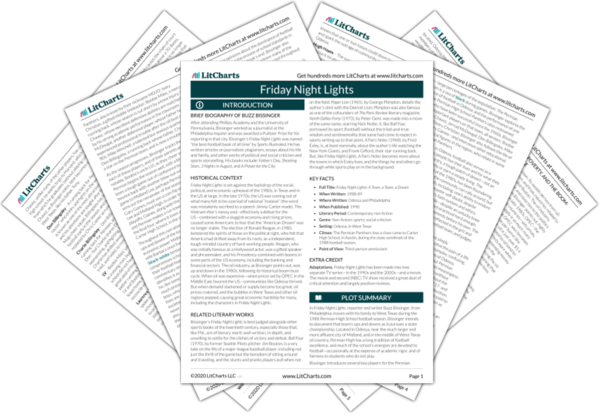Summary
Analysis
Bissinger returns to Boobie Miles, who, since that first scrimmage of the season, has been rehabbing his knee injury, attempting to break back into the starting lineup. When Boobie returns after several weeks, he is assigned a white practice shirt, rather than a black starter’s shirt, during the week before the Odessa Game. Trapper, the Permian trainer, and Belew, an assistant coach, are shocked when they realize that Boobie thinks he’ll play against Odessa, especially since Comer, who has filled in for Boobie, has been performing so well.
The exchange of the black shirt for the white one is a symbolically heavy experience for Boobie, who feels that, despite his injury, he is still one of the most talented members of the team. The white vs. black shirt, like the white-black divisions in the town, and the starkness of the line between success and failure, is just another indication of how quickly a football career can catapult one to stardom—or result in one’s being relegated to the bench.
Themes
Boobie does eventually get some playing time the following week against Abilene, a team that, in his junior year, Boobie performed extremely well against. But Boobie’s numbers are mediocre—he averages only a few yards per carry coming back from his injury—and he appears “tentative” on his rehabbed knee, unable to twist and turn as convincingly as before. LV, in the stands, wonders aloud to Bissinger whether it’s OK to have Boobie playing so soon after his injury, especially since the “ultimate goal” is to have Boobie play D-1 college football. But LV is convinced that Boobie is right to be back on the field, trying to compete.
It is more or less a miracle that Boobie is even playing at all, since, if the injury were even slightly more severe, Boobie would have to sit out many months, and the rehab process would be especially painful. Some coaches feel that Boobie is perhaps rushing his rehab, in order to get back on the field sooner, and others argue that, since Boobie has been “cleared” by the doctors, he should play and not complain about his knee at all. Both stances are unfair to Boobie, who wants, mostly, another shot at playing on the field, another shot at getting a scholarship.
Themes
Bissinger notes that Comer retains the starting job, and that Boobie’s numbers continue to be pedestrian—an average of a couple yards per carry, no games over more than 70 or so yards. The assistant coaches and trainers, including Trapper—who appears to dislike Boobie’s me-first attitude—complain that Boobie does not care about the team. They also insinuate that Boobie is somehow “weak,” for favoring his rehabbed knee. Bissinger reports that, for the Permian staff, if someone is medically cleared to play, that means they’re OK, no ifs, ands, or buts. But, of course, Boobie is not 100% on his knee—even if coaches refuse to acknowledge that.
The black-and-white divide is apparent here, too, in the assistant coaches’ idea of being “weak” or “strong.” Coaches see players as being either “injured,” which means they sit on the bench and get better, or they are “OK,” which means they play and do not complain. This, of course, ignores a whole set of circumstances in the middle, when players play through considerable pain, possibly risking additional or lifelong injury by doing so. Boobie occupies exactly this gray area between the two extremes, and the coaches then blame him for it.
Themes
Briefly, at the close of the chapter, Bissinger notes that Winchell has had a very strong beginning of the season, especially in the Abilene game, where he throws four touchdowns early on. But Winchell still retains that fundamental doubt in his abilities, a nervousness that, he fears, will come out during the upcoming game with Midland Lee, the game Bissinger describes in the Prologue of the book. Winchell wonders if he has the skills necessary to play QB in college, and though he is occasionally brilliant at the position, still his nerves and anxieties dog him, and he is capable of costly mistakes and interceptions on the field.
Winchell’s doubt is another example of the white-and-black divide. Winchell is a great football player, very talented, and it appears that he should, quite simply, have a star season. But his anxiety causes him to play as though he were not talented—it is as though he exists in a gray area between “star” and “goat,” and has trouble navigating, at any particular moment, whether he will save the day, or be responsible for Permian’s demise.
Themes
Get the entire Friday Night Lights LitChart as a printable PDF.













